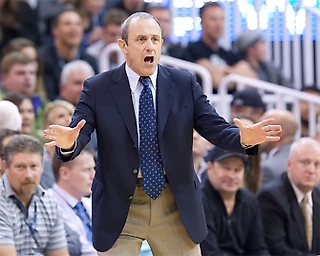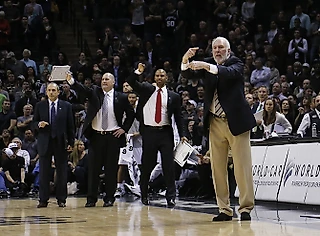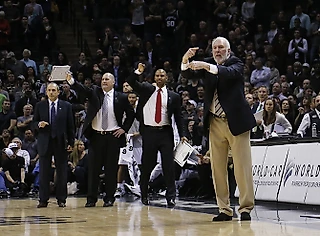Questions and Answers: Part 1
Messina Online
I would like to give answers to all questions you posted, but unfortunately we entered a crucial part of the season and we have a really busy schedule. So I can afford answering just a few questions. Thank you in advance for your understanding.
Q: How to convince a young player that he can advance to the next level? How to make him accept this as a goal?
(sith 11 Марта 2007, 12:15)
Q: From my experience as a top-manager in a very competitive market segment, only those who were confident in advance were able to keep up with challenges and achieve results. Is it possible to convince a player (an employee) that he is able to do what’s required from him?
(maxzz 4 Марта 2007, 14:37)
A: Usually, coaches have more confidence in the potential of a player than the player himself. Especially, when a player is young and cannot understand his potential. To develop his abilities player must have some level of aggressiveness and determination. However, being able to develop one’s abilities is not just a matter of desire. It’s more a matter of understanding the potential.
Once you understand the potential of a player, you can offer him the challenges that would help him to gain more confidence. The best way for the player to gain confidence is to feel that the teammates have confidence in him. If coach wants to help some player to feel confident, he should work with the other players so that they get more trust in that particular player. Most of the times, it’s not about the direct relationships between a coach and a player. Players’ confidence depends more on the way they are perceived by their colleagues.
Q: Is it easy for you to admit mistakes? What is the best way for a manager (coach) to admit mistakes? Should a manager (coach) admit them in public? How not to let your employees (players) doubt your professional abilities?
(Майк 9 Марта 2007, 16:26)
A: I feel that admitting mistakes is not a sign of weakness. It’s just a part of being correct towards the people you work with. I admit my mistakes. I believe that you cannot always find faults with players without realizing that sometimes you make mistakes too. In substitution, in designing system, in deciding whether to play man-to-man or zone defense. I don’t think that admitting mistakes is always a matter of credibility. If you made a big mistake, take the responsibility to admit it. It’s a matter of being honest with yourself and with your players. Of course, you cannot make mistakes too often, because players will decide you’re not good enough.
Q: (Addressing the questions about CSKA players and other coaches)
A: Let me not to answer these questions for one simple reason. I don’t think it’s fair to discuss player’s abilities and problems in public. I try not to discuss individual performances even during press-conferences. It’s a line you should cross rarely. And if you cross it, you should have a very strong reason for that.
The same regards coaches. Generally speaking, I respect all of them for their effort, their abilities and their achievements. It’s not that I like everybody. Like every human being, I like somebody more than somebody else. However it would be incorrect to express my feelings in public. All CSKA people behave correctly with other people.
Q: What’s the red line in your team no one is allowed to cross? JR in one of the previous games missed 5 three-pointers and then hit the crucial one during final seconds? Does this reflect the amount of trust he has with you?
(Starkom 5 Марта 2007, 11:14)
A: It’s important to understand that you don’t trust all the players in the same way. This is how it works in life. I’ll give you a very simple example. When I lived in Bologna, I went downstairs, to my favorite place where I bought my newspaper. They would give me a newspaper even if I didn’t have money to pay for it. Because they knew I will pay the day after. But I’ll never get such credit, if I do the same in Moscow or even in Bologna in some other place. You need to earn this trust first, by showing you’re reliable person.
It’s obvious that I have confidence in the player that I coached for over a year, a player who has been with CSKA for 5 years and who contributed a lot into last year’s titles. You just feel you trust him. If one day you feel a player is out of the game mentally or physically, you don’t use him in one particular game.
Players should consistently behave the right way to help their coaches and clubs gain confidence in them. I cannot give confidence for free. It’s like in every human relationship. You give confidence if the other person makes something to deserve it.




